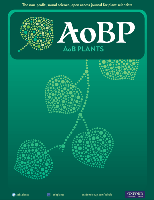
AoB Plants
metrics 2024
Leading the way in plant science advancements.
Introduction
AoB Plants is a distinguished open-access journal published by Oxford University Press, dedicated to advancing the field of plant science. Since its inception in 2009, this journal has played a pivotal role in disseminating high-quality research that encompasses a wide range of topics including plant biology, ecology, and biotechnology. With an impressive impact factor and a ranking in the Q1 quartile for Plant Science, AoB Plants is recognized for its innovative contributions and scholarly rigor, ranking #129 out of 516 in the Scopus Agricultural and Biological Sciences category, placing it in the 75th percentile among its peers. By promoting open-access availability of research findings, the journal empowers researchers and practitioners alike, facilitating greater collaboration and knowledge sharing in the global scientific community. Situated in the heart of the United Kingdom, AoB Plants continues its commitment to providing a platform for pioneering research and developments in plant science, thus fostering a deeper understanding of the crucial roles that plants play in our ecosystems and economies.
Metrics 2024
 0.70
0.70 2.60
2.60 3.00
3.00 58
58Metrics History
Rank 2024
Scopus
IF (Web Of Science)
JCI (Web Of Science)
Quartile History
Similar Journals
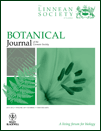
BOTANICAL JOURNAL OF THE LINNEAN SOCIETY
Unveiling the Complexity of Flora and Fauna InteractionsThe Botanical Journal of the Linnean Society, published by Oxford University Press, stands as a premier platform for interdisciplinary research within the realms of Ecology, Evolution, Behavior, and Plant Science. With a notable impact factor reflective of its esteemed reputation, this journal is classified in the Q1 quartile for both Ecology and Plant Science, placing it among the most influential publications in these fields. Since its inception in 1969, and with an anticipated convergence of research extending to 2024, it has become essential for scholars and professionals seeking to engage with cutting-edge studies, theoretical frameworks, and practical applications that drive our understanding of plant biology and ecological systems. The journal’s commitment to excellence is underscored by its robust Scopus rankings—achieving an impressive 83rd percentile in Ecology and a 82nd percentile in Plant Science. This makes the Botanical Journal of the Linnean Society a crucial resource for researchers, educators, and students alike, eager to advance their knowledge and contribute to the evolving discourse in botany and environmental studies.

Egyptian Journal of Botany
Exploring the depths of ecological research.Egyptian Journal of Botany is a premier publication in the field of botanical sciences, encompassing agricultural research, plant biology, and ecology. Published by the NATL INFORMATION DOCUMENTATION CENT, ACAD SCIENTIFIC RESEARCH & TECHNOLOGY in Egypt, this journal has made significant strides since its establishment, now recognized within several prestigious Scopus quartiles including Q3 in Agronomy and Crop Science, and Q3 in Ecology, reflecting its impact and relevance in the scientific community. With an aim to disseminate high-quality research and foster innovation in plant sciences, the journal provides a platform for researchers, professionals, and students alike to share vital findings and advancements. Although it currently operates under traditional access, the wealth of knowledge it offers is pivotal for those engaged in ecological preservation, crop improvement, and biotechnological applications. With its comprehensive scope and evolving reputation, the Egyptian Journal of Botany is poised to remain an influential player in the botanical sciences from 2019 to 2024 and beyond.

Tropical Plant Biology
Illuminating the Richness of Tropical Plant BiologyTropical Plant Biology is a premier academic journal published by Springer, dedicated to advancing the understanding of tropical plants and their ecological significance. With an ISSN of 1935-9756 and an E-ISSN of 1935-9764, this journal serves as a vital platform for researchers, professionals, and students focused on the fields of Genetics and Plant Science. Notably recognized in 2023 as a Q2 journal in Plant Science and Q3 in Genetics, it ranks 171st out of 516 in Agricultural and Biological Sciences and 227th out of 347 in Genetics according to Scopus. The journal encompasses a diverse range of topics, offering insights into tropical plant biology, ecology, conservation, and biodiversity. Although it does not currently operate under an open-access model, it remains an essential resource for anyone passionate about tropical ecosystems and their intricate relationships. With contributions spanning from 2009 to 2024, Tropical Plant Biology continues to foster scholarly discourse and innovation in the field.

JOURNAL OF PLANT RESEARCH
Unlocking the Secrets of Plant Ecology and Agriculture.JOURNAL OF PLANT RESEARCH, published by SPRINGER JAPAN KK, is a leading academic journal that has carved a niche in the field of Plant Science. With its ISSN 0918-9440 and E-ISSN 1618-0860, this journal has been disseminating high-quality research since its inception in 1993 and continues to be essential reading for academics and practitioners alike, aiming to bridge the gap between innovative plant research and practical applications. The journal is highly regarded, holding a prestigious Q1 ranking in Plant Science for 2023, and is positioned in the top 80th percentile within the Scopus rankings for Agricultural and Biological Sciences. The journal's coverage includes a wealth of topics pertinent to advancing our understanding of plant biology, ecology, and sustainable agricultural practices. Although it operates under a subscription model, its influence in the research community remains profound, making it a vital resource for contemporary studies in plant-related disciplines.
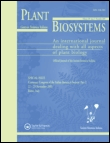
PLANT BIOSYSTEMS
Bridging Knowledge Gaps in Plant Biosystems ResearchPLANT BIOSYSTEMS, published by TAYLOR & FRANCIS LTD, is a leading academic journal dedicated to advancing the understanding of plant systems and their ecological interactions. With an ISSN of 1126-3504 and an E-ISSN of 1724-5575, this journal holds a significant place in the fields of Ecology and Plant Science, earning a Q2 rank in both categories as of 2023. Established in 1993 and continuing robustly through to 2024, it aims to provide a platform for pioneering research that encompasses a wide array of topics, from evolutionary biology to plant-environment interactions. Although not an open-access journal, it maintains a strong reputation, backed by its impressive Scopus rankings—positioned at #179 in Ecology, Evolution, Behavior and Systematics and #138 in Plant Science, placing it within the top percentiles. PLANT BIOSYSTEMS is a vital resource for researchers, professionals, and students who are keen to contribute to and learn from cutting-edge findings in the ever-evolving domain of plant sciences.

Botanical Studies is a premier open-access journal published by Springer, dedicated to the field of botany and plant sciences. Since its establishment in 2006, the journal has championed innovative research and scholarship that explores diverse botanical topics ranging from plant systematics to ecology and conservation. With a commitment to broad accessibility, it promotes the dissemination of knowledge to researchers, professionals, and students worldwide. Botanical Studies fosters academic collaboration and dialogue, contributing significantly to the global botanical community. Its open-access policy allows unrestricted access to its high-quality, peer-reviewed content, ensuring that vital research is available to all. Join the growing community of scholars advancing botanical science through this essential publication, conveniently located at One New York Plaza, Suite 4600, New York, NY 10004, United States.

ACTA PHYSIOLOGIAE PLANTARUM
Illuminating the science behind plant growth and development.ACTA PHYSIOLOGIAE PLANTARUM, published by Springer Heidelberg, is a leading journal dedicated to advancing the fields of Agronomy, Plant Science, and Physiology. With an ISSN of 0137-5881 and an E-ISSN of 1861-1664, this esteemed publication has a significant global outreach, being based in Germany. The journal is recognized for its impactful contributions, currently holding a Q2 ranking in both Agronomy and Crop Science, as well as Plant Science, and a Q3 ranking in Physiology according to 2023 category quartiles. Its Scopus rankings reflect its reputable standing within the academic community, with notable placements in Agricultural and Biological Sciences, further highlighting its importance for researchers and professionals in the field. The objective of ACTA PHYSIOLOGIAE PLANTARUM is to foster robust discussions and disseminate innovative studies that enhance our understanding of plant physiology and its applications. Though not an open-access journal, it provides comprehensive access options for readers keen on exploring cutting-edge research that drives advancements in agricultural productivity and sustainability. Through its dedication to excellence, this journal continues to be a vital resource for advancing knowledge and practices in plant sciences.
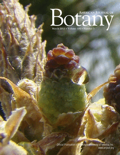
AMERICAN JOURNAL OF BOTANY
Fostering Innovation in Ecology and Plant GeneticsAmerican Journal of Botany, an esteemed publication by Wiley, serves as a pivotal platform for the dissemination of groundbreaking research in the fields of botany, ecology, plant science, and genetics. With an illustrious history dating back to 1946, this journal holds a prestigious position in the academic community, evident through its Q1 ranking in both Ecology, Evolution, Behavior and Systematics and Plant Science, alongside a Q2 ranking in Genetics as of 2023. The journal maintains a competitive edge, ranked 159th in Ecology and Evolution and 124th in Plant Science according to Scopus metrics, underscoring its impact within the research landscape. Though traditionally not an open-access journal, it continues to provide valuable insights and advancements in botanical science, making it essential reading for researchers, professionals, and students dedicated to understanding and exploring the complexities of plant life. The journal's commitment to high-quality research ensures that it remains a cornerstone in the pursuit of knowledge in botany and related disciplines.
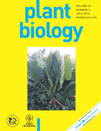
PLANT BIOLOGY
Innovating Research for a Greener TomorrowPLANT BIOLOGY is a prestigious academic journal published by Wiley, dedicated to advancing knowledge in the fields of plant science, ecology, and evolutionary biology. With an impressive impact factor and ranking in the Q1 category for Ecology, Evolution, Behavior and Systematics, and Plant Science as of 2023, it stands at the forefront of research dissemination. The journal encompasses a broad scope of plant biology topics, providing a critical platform for researchers to share innovative findings and foster interdisciplinary collaboration. Available in both print (ISSN: 1435-8603) and online formats (E-ISSN: 1438-8677), it ensures accessibility through open access options. As a crucial resource for professionals, researchers, and students alike, PLANT BIOLOGY cultivates a deeper understanding of plant systems and their ecological significance, making it an essential addition to the library of anyone dedicated to the study of biology and the environment.

Plant Biotechnology Reports
Pioneering Discoveries in Plant BiotechnologyPlant Biotechnology Reports is a premier academic journal published by SPRINGER, focusing on cutting-edge research in the dynamic fields of biotechnology and plant sciences. With an ISSN of 1863-5466 and an E-ISSN of 1863-5474, this journal serves as a vital platform for disseminating high-quality studies from 2008 to 2024. Situated in Japan, it has earned commendable status within the academic community, ranking in the Q2 quartile for Plant Science and Q3 for Biotechnology in 2023, placing it among the top-tier publications in its domain. Notably, it ranks #160/516 in the Scopus category for Agricultural and Biological Sciences - Plant Science, reflecting its impact and reach in the relevant fields. While it does not currently offer open access, the journal remains an essential resource for researchers, professionals, and students eager to explore breakthroughs in plant biotechnology. Researchers contribute significant advancements that not only drive scientific understanding but also foster innovation in agricultural practices, making this journal pivotal for both academic and practical applications in the realm of biotechnology.